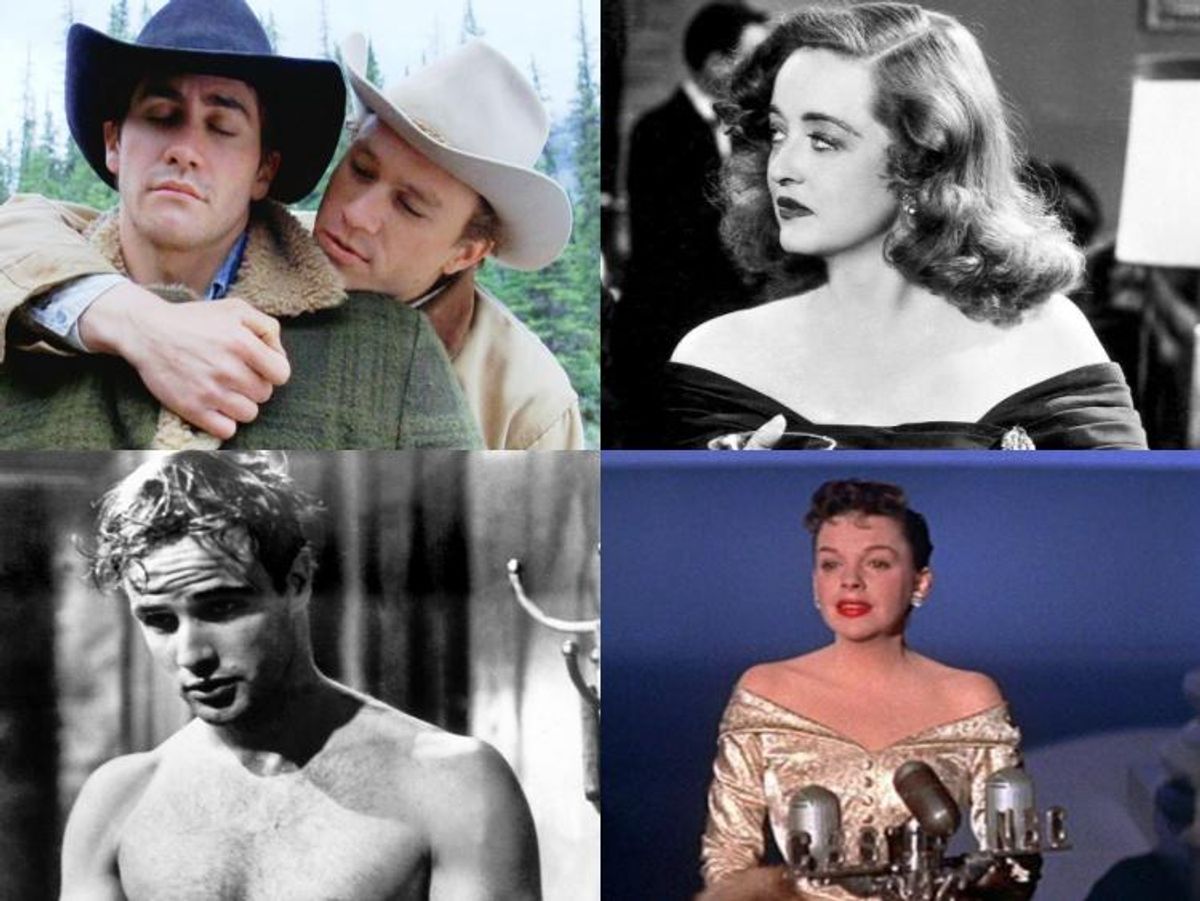We saw it in the World Series. We saw it in the presidential election. We saw it in the Super Bowl. And most recently, we saw it at the Grammys. It's been an upsetting few months, full of upsets, when those favored to win somehow ended up wandering through the woods contemplating where it all went wrong. And just as Adele waltzed away with the top prize over Beyonce at the Grammys, I've fully girded myself for La La Land to win Best Picture over Moonlight at Sunday's Academy Awards. Because the Oscars are great at getting it wrong.
While lots of people have deservedly snatched Oscars over the years, there are any number of standout films and performances that have been cruelly overlooked. Here, a brief history of the Academy Awards pulling off grand theft trophy.
Citizen Conned

Year: 1942
Robbed of: Best Picture
Lost to: How Green Was My Valley
Though it's regarded as the greatest film Hollywood has ever produced--the Citizen Kane of films, if you will--upon its release, Orson Welles's masterpiece posted a $150,000 loss, thanks in large part to the efforts of William Randolph Hearst. The film's protagonist, Charles Foster Kane, was a thinly-veiled Hearst surrogate, and so the publishing magnate did his darndest to bury the film. When Citizen Kane won its only Academy Award (for Best Original Screenplay), some Hearst loyalists in the audience booed Welles and co-writer Herman J. Mankiwiecz.
Bette Davis - All About Thieves

Year: 1951
Robbed of: Best Actress
Lost to: Judy Holliday for Born Yesterday
The 23rd Academy Awards may be the toughest Best Actress race in Oscar herstory, with All About Eve's Bette Davis squaring off against Sunset Blvd's Gloria Swanson--two legendary, larger-than-life performances that revived the careers of the two aging actresses.
Related | Glenn Close, Back on Sunset Blvd. and Ready for Her Close-Up
Davis--the bigger star with the bigger comeback--was favored to win, but legend has it that Davis's co-star Anne Baxter hampered her chances of winning by also throwing her hat into the Best Actress category (also marking the first time that two actresses from the same movie were nominated in that category).
Related | All About Eve and the Art of The Read
While Baxter was great in Eve, it's obviously more of a supporting role; Davis and Swanson most likely canceled each other out, leaving the path clear for Judy Holliday to win for her brilliant comedic turn in Born Yesterday. So you can call this a double robbery. Swanson, a previous two-time nominee, would not receive another nomination, but Davis was robbed one last time--in 1963 for Whatever Happened to Baby Jane?, thanks in part to her Feudwith Joan Crawford.
Marlon Brando: A Streetcar Named Deprived

Year: 1952
Robbed of: Best Actor
Lost to: Humphrey Bogart for The African Queen
Marlon Brando essentially changed screen acting forever when he brooded his way onto the screen in Elia Kazan's adaptation of the Tennessee Williams play. Brando had caused a sensation and was largely expected to win, but Bogart--a Hollywood icon for decades by the time Brando stormed onto the scene--walked away with his first and only Oscar. Adding insult to injury, Brando's co-stars swept every other acting category: Vivien Leigh won her second Best Actress trophy (the first being for Gone with the Wind, in which the Brit thesp played a completely different Southern belle), and Kim Hunter and Karl Malden took home Best Supporting Actress and Actor, respectively.
The film was also robbed of Best Picture, with the musical An American in Paris upsetting both Streetcar and the other prestigious, critically-acclaimed drama of that year, A Place in the Sun, starring Elizabeth Taylor and Brando's method acting contemporary Montgomery Clift.
Related | Today in Gay History: Montgomery Clift Born in 1920
As for Brando, Streetcar was the first of his four consecutive Best Actor noms; he eventually won for his landmark performance in On the Waterfront in 1955 and again in 1973 for The Godfather, which he famously refused to accept in protest of the media's depiction of native peoples.
Judy Garland - A Star Is Robbed

Year: 1955
Robbed of: Best Actress
Lost to: Grace Kelly in The Country Girl
In what Groucho Marx called "the greatest robbery since Brink's," Judy Garland's big comeback vehicle was driven off the road. Her universally acclaimed performance as Esther Blodgett/Vicki Lester was the quintessential Hollywood comeback, and just about everybody expected her to win on Oscar night. Including Garland. Eight months pregnant by the time the Academy Awards rolled around, Garland was joined in her hospital room by a camera crew to capture her victory speech. But when Kelly was announced the winner, also for playing the wife of an alcoholic, the crew quietly packed up their equipment and left Garland alone with her disappointment.
Related | Judy, Babs, Gaga: A Star Is Born As the Diva's Rite of Passage
Garland never truly got over the loss, taking it as yet another sign that Hollywood hated her. Some claim the always problematic Garland's behavior on the set cost her the award, while others blamed Warner Bros. for not throwing their support behind the film. Either way, Garland's was not the only historic loss that night: Dorothy Dandridge, the first black woman nominated for Best Actress, also got stiffed for her turn in Carmen Jones.
Related | A Brief History of Diversity (or Lack Thereof) at the Oscars
The tiny gold man that got away.
Alfred Heistcock

Alfred Hitchcock made an indelible mark on 20th century film, and in filmmaking in general, but you wouldn't know it looking at his history at the Academy Awards. Despite creating masterpieces like Notorious, Spellbound, North by Northwest, Rear Window, Vertigo, and Psycho, Hitchcock, though nominated five times, never won a Best Director Oscar. And only one of his films ever own Best Picture: the 1940 queer classic Rebecca.
Peter O'Stole

Peter O'Toole was one of the greats. Nominated an impressive eight times for Best Actor, O'Toole lost every single one of them (a record, btw): from his first in 1963, Lawrence of Arabia (losing out to Gregory Peck for To Kill a Mockingbird) to his last in 2007, Venus (losing out to Forest Whitaker for The Last King of Scotland).
When he he learned he was the recipient of the Academy's Lifetime Achievement Award in 2003, O'Toole hesitated to accept it, writing a letter to the Academy arguing that he was "still in the game" and would like more time to "win the lovely bugger outright." But since the Academy was going to give him the honor whether he wanted it or not, O'Toole conceded and finally got his chance to accept the lovely bugger, even if it was out of competition.
Martin Scorsese - Raiding Bull/Gougedfellas

Years: 1981, 1991
Robbed of: Best Director
Lost to: Robert Redford for Ordinary People, Kevin Costner for Dances with Wolves
For a while, it felt like the Academy was purposely fucking with Martin Scorsese, like they had some grudge against him. One of the most acclaimed directors to ever step behind a camera, Scorsese didn't win his first Oscar till 2007 for The Departed. He was completely overlooked for 1976's Taxi Driver, making Raging Bull his first Best Director nomination. And he lost to actor turned first time director Robert Redford for the melodramatic Ordinary People.
Then, frustratingly enough, Scorsese lost out to another actor turned first time director in 1991 when Kevin Costner beat him out for Dances with Wolves. Over Goodfellas. Let that sink in for a minute. I'm surprised the FBI wasn't called in after that robbery, but if that's not bad enough: Scorsese wasn't even nominated for Best Director for 1995's Casino, while actor turned second time director Mel Gibson walked away with that award and Best Picture for Braveheart. And look how well that turned out.
The Color Plundered

Year: 1986
Robbed of: Everything
Lost to: Everyone
Along with 1977'sThe Turning Point, The Color Purple remains the most nominated film to not win a single Oscar. With 11 nominations, including Best Actress and Supporting Actress for Whoopi Goldberg and Oprah Winfrey, The Color Purple was shut out largely by Out of Africa, which was also up for 11 awards, winning seven--the film's director, Steven Spielberg, was shut out completely. Meanwhile, the fact that Oprah still doesn't have a competitive Oscar is a national disgrace, but at least someone's working to rectify that.
Samuel L. Jackson - Pulp Filching

Year: 1995
Robbed of: Best Supporting Actor
Lost to: Martin Landau for Ed Wood
The '90s were all over the place when it came to handing out Oscars, but one of the most egregious snubs came midway through the decade when Samuel L. Jackson lost out for his epic turn as Jules Winnfield in Quentin Tarantino's Pulp Fiction. Jackson, sadly, has just this one nomination to his name but, as the highest grossing box office star of all time, this is easily his most memorable performance. And it was the beginning of a beautiful friendship with Tarantino, who has cast Jackson in every subsequent film he's directed. But to paraphrase Jules, yes, Jackson deserved to win, and I hope he burns in...oh wait.
Sacking Private Ryan

Year: 1999
Robbed of: Best Picture
Lost to: Shakespeare in Love
What was everyone's obsession with Shakespeare in Love? And with Gwyneth Paltrow? We were all fooled, apparently, as the romantic comedy somehow beat out Steven Spielberg's iconic WWII film for Best Picture and Gwyneth snatched Cate Blanchett's Oscar for Elizabeth in the process. 20 years later and the Academy is still trying to live down what has to be one of the biggest WTF moments in its near-century of trophy-throwing. Meanwhile, Gwyneth Paltrow still has an Oscar--because some things you just can't live down.
Julianne Moore - Fleeced from Heaven

Year: 2003
Robbed of: Best Actress
Lost to: Nicole Kidman for The Hours
One could argue that any time Julianne Moore steps on screen she's been robbed, until finally winning for Still Alice in 2015, after five nominations and countless should've-been-nominations (looking at you, Magnolia and A Single Man). But her work in Far From Heaven is simply remarkable.
Todd Haynes's ode to Douglas Sirk melodramas brings out the best in Moore, who was nominated not just for Best Actress that year, but also for Best Supporting Actress for The Hours. And while I love Nicole Kidman in The Hours, and everything, I would've preferred her to win for Moulin Rouge and/or The Others, or, better yet, To Die For.
Related | Justice Warriors: Julianne Moore and Ellen Page Bring Marriage Equality to the Big Screen
Maybe being nominated in two separate categories in the same year negatively affected Moore's chance of winning either--Catherine Zeta-Jones cha-cha'd away with Supporting for Chicago--but at least the Academy made up for it years later. Which is more than I can say for our next actress.
Annette Bening - Bereaving Julia

Year: 2005
Robbed of: Best Actress
Lost to: Hillary Swank for Million Dollar Baby
I could, and would, dedicate an entire post to the amount of times Annette Bening has been robbed by the Academy, but the one that stung the most--at least, personally--was Bening's loss to Hillary Swank (for the second time). Being Julia is basically All About Eve set in 1930s London with Bening owning every inch of the screen as the titular temperamental theatrical diva on a vengeful rampage.
Bening had been up against Swank in 2000 for American Beauty, with Swank walking away for her role in Boys Don't Cry. Fair. But Swank certainly didn't need a second Best Actress Oscar, especially since she's done little to warrant the first one in the years since, while Bening has been doing marvelous work for years--most recently in 20th Century Women, for which she was snubbed of a nom, leaving me to wonder when, if at all, this injustice will ever be rectified.
Brokeback Muggedhim

Year: 2006
Robbed of: Best Picture
Lost to: Crash
Remember Crash? Yeah, me neither, but that forgettable foray into L.A.'s racial tensions beat out the favorite, Brokeback Mountain, probably because Brokeback was a bit too gay for the Academy. Ironic, since the Oscars is frequently cited as the gay Super Bowl. Still, Brokeback won some major awards, including Best Director for Ang Lee, but Crash was the name presenter Jack Nicholson choked out at the end of the night.
Related | Brokeback Mountain: 10 Years On: An Oral History
Alas, time has been better to Brokeback than the Academy was that night. Not only has Crash director Paul Haggis admitted that he thinks his film didn't deserve to win, but in a revisionist poll by The Hollywood Reporter, Academy voters gave Brokeback the top honor.
So will the gorgeous, contemplative story about loneliness and queer love lose out once again to the movie about L.A. that misses the mark on race? We'll have to wait till Sunday to see if the Academy has learned anything over the last 10 years or so when the 89th Academy Awards airs on ABC beginning at 7pm ET. Reacquaint yourselves with the nominees here.






































































































